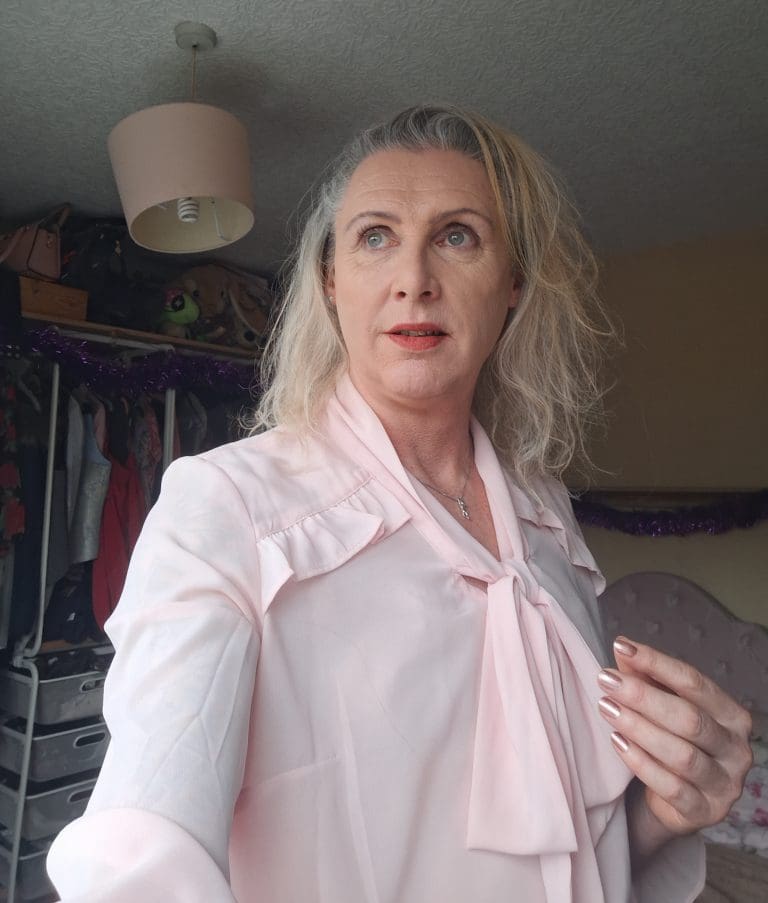
My name is Michaela, and I am a 55-year-old trans woman living in England. I was diagnosed in 2018 and have been in remission for 5 years. My diagnosis was before I transitioned.
Following a biopsy from a lymph node in my neck that went through my ear, nose and throat, the consultant told me I had cancer; more specifically, follicular lymphoma. He explained I would hear from the blood clinic and that was the end of the appointment. In shock, I rang my partner from the Aldi car park feeling tearful and somewhat emotional, and also because I knew nothing about my illness.
The following few months were challenging not least because the medical people I saw knew very little about follicular lymphoma, which I found to be extremely unhelpful. Diagnosis took six months during which I was told that ‘as we get older we get lumps’ without any examination or further explanation. I had lumps in my neck, armpits and all around my collarbone, yet I suffered no classic symptoms such as night sweats, weight loss and even had blood tests that showed up anything.
Finally, I managed to see a different GP to my previous visit who actually took the time to process my history and examine me properly. Although he wouldn’t commit to a diagnosis, he did refer me to an ear, nose and throat specialist who subsequently referred me to the blood cancer clinic.
Once I was aware of what I had and being educated to ‘the most popular cancer you never heard of’ and the ‘watch and wait procedure’ I had to endure a series of blood tests, scans and a spinal tap. Initially, I was diagnosed as stage 3 and then promptly got on with the rest of my life as a bag of cancer cells! I left my worries in the hands of the professionals and refused to dwell on living with FL.
My greatest challenge had been to actually get a diagnosis, which I believe was down to lack of knowledge by the doctors, and the fact that I presented as healthy.
After a routine CAT scan, I was diagnosed as stage 4. The CAT showed that I was literally full of cancer peas, mostly in my abdominal area. I was then admitted for O-CHOP and Obinutuzumab antiviral…which is where the real challenges began. Only in hindsight do I see how much of a toll the drugs took at the time with the side effects including a massive allergic reaction to the first dose of Obinutuzumab, resulting in several medical personnel having a good look at my itchy backside!
I was treated with chemo with Obinutuzumab over the next six months, finding each appointment harder and harder. Luckily, I received full sick pay as my job as a plumber wasn’t possible due to my compromised immune system. The cycle of two bad weeks followed by a good week was always odd to me because then the next treatment would batter me. And having to inject myself wasn’t something that was ever on my bucket list.
Still, I met others far worse off than me; those who had to have PICC lines due to collapsed veins; women suffering from breast cancer who’d had chemo swaps when the treatment wasn’t working. It kept me humble because at least I knew my treatment was working.
Once my chemo sessions were over, I had a CAT scan which showed a full metastatic remission. I carried on with Obinutuzumab for a further six sessions but was forced to stop due to it making me so susceptible to illness. I was left with an immune system of a baby falling uncharacteristically ill often in the last five years. Despite all of that life has to go on!
I got through shielding and survived Covid 19, enjoying getting to know my local area a bit better. And I finally reconciled myself to living in the gender I was always meant to be.
Like many others, I live with the cloud of cancer hanging over me and with the fact that my body tried to kill me. FL hasn’t been all that bad for me – I wouldn’t choose to have cancer, but I remain positive, and I try to put that forward every day.
FL affects us all differently, so my advice would be to keep your chin up and look forward. Have a goal to aim for. Lean on your friends and family as you are going to need them, but remember, they are going through it too.
Lastly – listen to your doctors and nurses and your blood clinic and always be honest with them. I can’t praise the fantastic NHS highly enough for the care they showed me.
Keep up the fight!